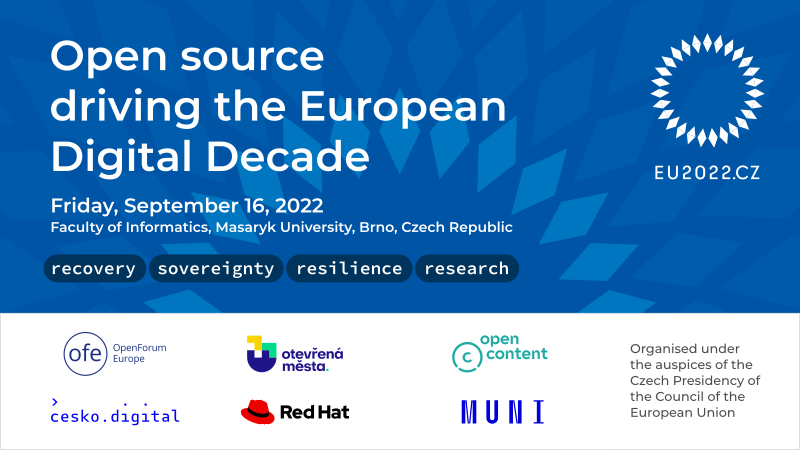Από περιθωριακή δραστηριότητα πριν από 20 χρόνια, το Λογισμικό Ανοικτού Κώδικα (OSS) είναι σήμερα το θεμέλιο καινοτομίας του ψηφιακού κόσμου. Στην πραγματικότητα, το 92% όλων των εφαρμογών χρησιμοποιούν στοιχεία ανοιχτού κώδικα . Εξακολουθεί να ισχύει ότι τα πρότυπα για τις μελλοντικές τεχνολογίες καθορίζονται από κοινότητες ανοιχτού κώδικα. Ως εκ τούτου, ο ανοιχτός κώδικας θα διαμορφώσει τις ψηφιακές αγορές για τα επόμενα χρόνια.
Κατά συνέπεια, ο αντίκτυπος και το δυναμικό ανάπτυξης του ανοιχτού κώδικα στην ευρωπαϊκή οικονομία είναι τεράστιο. Αυτό περιγράφηκε σε μια πολυδιαβασμένη μελέτη της Ευρωπαϊκής Επιτροπής , που δημοσιεύτηκε πέρυσι. Τα ευρήματα της μελέτης προβλέπουν ότι εάν οι συνεισφορές ανοιχτού κώδικα αυξηθούν κατά 10% στην ΕΕ, η περιοχή θα δει το ΑΕΠ της να αυξάνεται κατά 100 δισεκατομμύρια ευρώ, υπερδιπλασιάζοντας την αξία των OSS για την ΕΕ. Ωστόσο, σύμφωνα με την έρευνα, για να αποκομιστούν αυτά τα οφέλη, χρειάζεται αλλαγή κουλτούρας και σημαντικές επενδύσεις σε ανοιχτές τεχνολογίες.
Υπάρχει ήδη σημαντική δυναμική πίσω από τον ανοιχτό κώδικα ως σημαντικό εργαλείο για την προώθηση της καινοτομίας σε κλίμακα στην ευρωπαϊκή ψηφιακή πολιτική. Εκτός από τους κανόνες της ΕΕ για τις δημόσιες συμβάσεις που αναθεωρούνται για την υιοθέτηση και την πληρωμή λύσεων ανοιχτού κώδικα, υπάρχουν ολοένα και περισσότερες πρωτοβουλίες για την ενίσχυση της επιχειρησιακής ικανότητας του Δημόσιου Τομέα να συνεισφέρει στον ανοιχτό κώδικα, όπως με την νέα Στρατηγική Ανοικτού Κώδικα της Ευρωπαϊκής Επιτροπής , το Γραφείο Προγράμματος Ανοικτού Κώδικα (OSPO) , την τελευταία απόφαση αδειοδότησης ανοιχτού κώδικα και το έργο FOSSEPS
Για τις κυβερνήσεις, οι λύσεις ανοιχτού κώδικα παρέχουν ψηφιακές υπηρεσίες παγκόσμιας κλάσης που όχι μόνο ικανοποιούν τις απαιτήσεις της Ψηφιακής Ανεξαρτησίας, αλλά δημιουργούν επίσης θετικές οικονομικές εξωτερικές επιδράσεις για τη χώρα ή την περιοχή.
Εκτός από αυτές τις προσπάθειες πολιτικής του δημόσιου τομέα, από βιομηχανική πολιτική και γεωπολιτική προοπτική, το OSS συζητείται στρατηγικά από την Ευρωπαϊκή Επιτροπή και στις πρωτεύουσες των κρατών μελών. Είναι κεντρικό θέμα στις συζητήσεις γύρω από την ανταγωνιστικότητα, τον αυξημένο ψηφιακό ανταγωνισμό, την ανάπτυξη τεχνητής νοημοσύνης και την ασφάλεια στον κυβερνοχώρο.

Σε αυτό το πλαίσιο η Προεδρία της Τσεχίας στο Συμβούλιο της ΕΕ και οργανισμοί OFE, Open Cities και Redhat διοργανώνουν την ημερίδα “Open Source Driving the European Digital Decade | Czech Presidency” στις 16/11/2022 στο Μπρνό της Τσεχίας, την οποία μπορείτε να την παρακολουθήσετε και online (απαιτείται εγγραφή εδώ)
Το αναλυτικό πρόγραμμα της ημερίδας :
10:00 – 10:15 Welcome by the hosting organisations
- Axel Thevenét, OFE
- Lucie Smolka, Open Cities
- Leslie Hawthorn, Red Hat
- Barbora Bühnová, Faculty of Informatics at Masaryk University
10:15 – 10:25 Welcome Statement
- Ivan Bartoš, Minister for Digitisation of the Czech Republic
10:25 – 10:40 Keynote
- Veronica Gaffey, Director General, Directorate-General for Informatics (DG DIGIT), European Commission
10:40 – 11:15 Fireside Chat
This session is aimed at discussing the highest level of political goals that could be achieved with Open Source, as well as the perception of openness in shaping the digital policies of the future. There has been a surge of interest and discussions on this topic as the concept of digital sovereignty and transparency of digital infrastructures have been placed much higher on the European political agenda, thus the speakers would share their vision of the place of open source in these overarching debates.
- Ondrej Profant, Deputy of the Government Member and Vice Prime Minister for Digitization, Czech Republic
- Marcel Kolaja, Member of European Parliament
- Henri Verdier, Ambassador for Digital Affairs for the French Ministry for Europe and Foreign Affairs, France
11:45 – 12:40 How are EU governments collaborating to create cross-border collaboration and open source solutions? What does the digital government in Czech Republic look like?
The aim of this panel is to look at digitization from a practical point of view of the management of public authorities in the Czech Republic and other EU countries and institutions. The goal is to discuss important points to be delivered to enable cooperation and collaboration between governments within the nation and abroad, as well as to discuss the potential pathways for the Czech Republic to increase its participation in the Open Source ecosystem on the policy level.
- Petr Očko, Deputy Minister of Industry and Trade, Government of the Czech Republic
- Ondřej Profant, Deputy of the Government Member and Vice Prime Minister for Digitisation
- Veronica Gaffey, Director General, Directorate-General for Informatics (DG DIGIT), European Commission
- Maria Dalhage, Strategist Open Source and Data, Swedish Agency for Digital Development
Moderator: James Lovegrove, Director Public Affairs EMEA, Red Hat
12:40 – 13:30 How can the Czech Republic be at the heart of a connected Europe?
Several governments on different levels put their policy goals of more openness in the digital space to practise by setting up Open Source Programme Offices (OSPOs). What are their experiences so far and what are the biggest challenges and opportunities? Does the concept live up to the expectations? How can Czech Republic accelerate the uptake of OSPOs in order to facilitate collaboration and the benefits of Open Source for the public sector?
- Jiří Hlavenka, Governor of South Moravian Region for Innovation and Digitisation
- Petra Dzurovcinova, CIO, City of Bratislava
- Jakub Onderka, Cybersecurity Analyst, National Cyber and Information Security Agency
- Karel Minařík, CTO, Česko.Digital
Moderator: Lucie Smolka, Chairman of the Committee, Open Cities
13:30 – 14:30 Lunch
14:30 – 16:00 Expert discussion on action plans to establish the Czech National OSPO for public administration
Διαβάστε περισσότερα για την εκδήλωση εδώ
Πηγή άρθρου: https://openforumeurope.org


